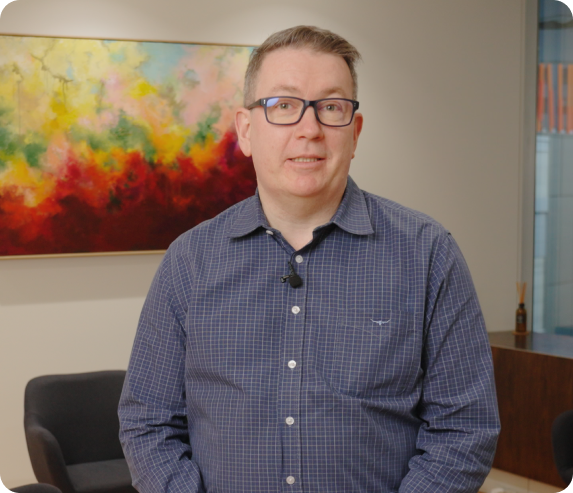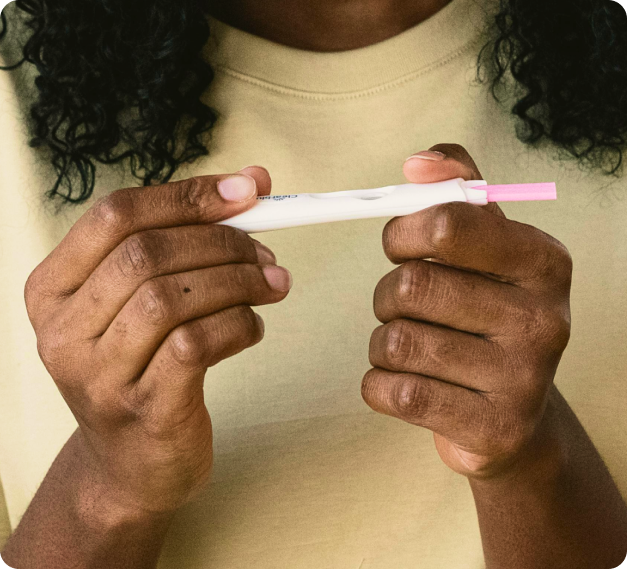
Endometriosis is a chronic fertility condition where the endometrial tissue grows outside the uterus, causing pain, inflammation, and sometimes infertility.
This misplaced tissue can be found on the ovaries, fallopian tubes, and other areas within the pelvis. It responds to the menstrual cycle in the same way as the lining of the uterus, leading to painful periods and other symptoms.
It affects approximately 10% of all women, with higher prevalence rates seen in specific groups: up to 50% of women undergoing laparoscopy for pelvic pain and a similar proportion for infertility investigations. Notably, the severity of endometriosis does not always correlate with the intensity of pain experienced, highlighting the variability of its impact.

Common Symptoms
Some studies link endometriosis with a higher risk of anxiety and depression. The chronic pain from endometriosis can create a cycle where pain increases anxiety, and that anxiety, in turn, can worsen the pain.

Mild to moderate endometriosis is associated with a significant reduction in spontaneous fertility, with chances decreasing by roughly half. However, the evidence linking severe endometriosis to reduced fertility and its effects on IVF outcomes remains less clear.
Symptoms more on the mild side include manageable pelvic pain, light changes in your period, occasional tiredness, and some discomfort during sex.
On the other hand, extreme symptoms can include constant pelvic pain that makes it hard to go about your day, very heavy periods, intense pain during sex, serious stomach issues like bloating or constipation, and difficulty getting pregnant.

Diagnosis of endometriosis typically requires laparoscopy, which is considered the "gold standard" for identifying the condition. When diagnosed, surgical excision is generally the preferred treatment.
The only time endometriosis would not be treated at the primary laparoscopy is if severe endometriosis (involving the bowel) is unexpectedly encountered.
It is important to be aware of the potential risks of surgery, which include anaesthetic complications, bleeding, infection, venous thromboembolism (blood clots), and potential damage to organs such as the ureters, bladder, bowel, or blood vessels.

Non-surgical treatments often start with medication. Anti-inflammatory pain relievers can help manage discomfort. Hormonal therapies are another common choice; these can help regulate or even stop periods, which may reduce symptoms. Lifestyle changes, such as regular exercise, a healthy diet, and stress management techniques, can also make a big difference in how you feel.
Surgical treatments are usually considered if other options haven’t worked or symptoms are severe. The most common surgery is laparoscopy, a minimally invasive procedure where a doctor removes endometriosis tissue. This can bring significant relief and may improve fertility for some women. In more severe cases, a hysterectomy, which removes the uterus, might be suggested, but this is generally a last resort.
Surgery for endometriosis can sometimes negatively impact ovarian reserve, especially when ovarian endometriosis is removed. Despite these risks, surgery can provide significant pain relief, with 70-80% of women reporting improved pain scores. However, some may experience persistent or new pain after the procedure, underscoring the need for individualised treatment plans.

The growth of endometrial-like tissue outside the uterus can cause inflammation and scarring. We believe the inflammatory environment has a negative impact on egg quality. Scarring may block the fallopian tubes or affect the ovaries and uterus. This can make it harder for eggs and sperm to meet or for a fertilised egg to implant.

Despite these challenges, many women with endometriosis can still conceive naturally or with treatments like medication, IVF, or surgery to remove the endometriosis.
Lifestyle changes include a balanced diet full of fruits, vegetables, whole grains, and healthy fats. Regular exercise and stress-reducing practices like yoga can also be beneficial for managing symptoms and overall health.
Assisted reproductive technologies (ART), especially in vitro fertilization (IVF), can also be effective. IVF involves retrieving and fertilising eggs in a lab before implanting the embryos, which can help bypass some endometriosis-related complications.
If the condition is severe, surgery to remove endometrial tissue may improve your chances of conceiving.

Endometriosis is a complex condition that requires careful diagnosis and management, particularly for women experiencing infertility or significant pain. I have a deep understanding of endometriosis and the impact on fertility and can support you from the investigation stage - through to surgery and fertility treatment if needed.
Most importantly, I'm dedicated to helping you find answers. Endometriosis has come with a stigma attached for a very long time; you can trust me to do everything I can to relieve your pain and bring clarity (and maybe even grow your family).
Endometriosis occurs when tissue similar to the uterine lining grows outside the uterus, causing inflammation, pain, and sometimes infertility. The exact cause is unknown but may involve genetics, immune dysfunction, or retrograde menstruation.
There is no cure, but treatments such as hormonal therapy, pain management, and surgery can help manage symptoms.
Treatment depends on severity and may include:
Diagnosis often requires laparoscopy, a minimally invasive surgical procedure that allows direct visualization and biopsy of endometriotic lesions.
Yes. Endometriosis can cause inflammation, scarring, and blockages in the reproductive organs, reducing fertility. However, many women with endometriosis conceive naturally or with fertility treatments.
Yes. Dr. Anthony Marren specializes in diagnosing and managing endometriosis, providing both medical and surgical treatment options.
Surgery is an option for severe cases or when fertility is impacted. Laparoscopic excision is the preferred method for removing endometrial lesions.